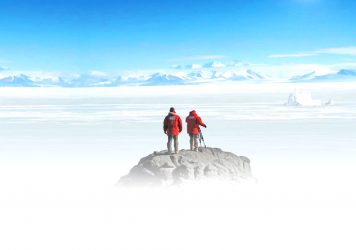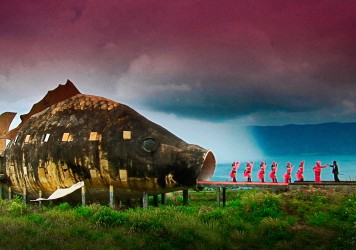Ron Fricke’s panoramic global escapade from 1992 still offers a real feast for the senses.
Ron Fricke’s 1992 documentary Baraka offers welcome cinematic relief in an age of special effects, superstars and predictable, formulaic multiplex fodder. It defies tired conventions in a refreshing experiment which takes us on an epic visual voyage to see the wonders of the world. Baraka presents a real, non-fictional wonderland just as enchanting as Hogwarts, as grand as the kingdom as Gondor, but without the need for vast swathes of CGI trickery.
Presenting itself as ‘A world beyond words’, the film steers away from traditional narrative techniques and instead offers a thought-provoking, dialogue & plot free spectacle which speaks a language that is entirely visual. Individual frames weave a rich tapestry, captivating the imagination. Michael Stearn’s stirring score ranges from a brooding groan to an operatic cry and serves to intensify Fricke’s atmospheric visuals.
Divided into three loosely connected chapters, Baraka presents an appraisal of the planet in terms of its natural history and human geography. It also explores Fricke’s pet theme of humanity’s relationship to the eternal. The first and final chapters present a kaleidoscopic montage of both natural and human spectacles, including an observation of world faith, religion and custom. What distinguishes the two chapters is the theme of evolution – showing man’s intervention with the planet.
Perhaps the most interesting section comes mid-way through where the initially utopian landscape is interrupted by the destructive felling of a tree, which precedes an aeroplane soaring through the sky, its engine’s roar piercing the film’s quietly hypnotic soundtrack.
This imagery signals a change in tone for the film’s second chapter, a thematic visual critique of modernity, the industrial revolution and the subsequent dehumanisation of the population. Workers on a production line and commuters in transit depict a society engaged in the mundane and disengaged from each other – figures in motion moving blurrily and busily without connection.
Visually, Fricke casts a somewhat voyeuristic gaze upon the globe, his camera acting as a fascinated eye slowly surveying the scene in amazement. The film experiments with motion, using time-lapse photography to interrogate subjects from a new perspective. Frequently photographed landmarks such as Ayers Rock are the Himalayas are transformed into mystical creature-like forms.
The organised chaos of a New York traffic jam is re-energised into a surreal and playful display of pattern and light. Moments of contemplative stillness interject these frenzied flashes, capturing an almost statuesque immobility in the frequent intimate portraits of the human race, from inner city commuters to meditative tribespeople.
Whilst aesthetically absorbing, one could be forgiven for, at times, feeling a bemused speculation as to how all this imagery fits together. The film provides something of an alternate viewing experience and one which requires effort, perseverance and imagination. But the reward is truly mesmeric.
Published 13 Dec 2012
Widely regarded as one of cinema’s most stunning and inventive non-narrative adventures.
Around the world in 90 minutes.
A cinematic sight for sore eyes.

As an observational study of people and place, Werner Herzog’s documentary is truly fascinating.

Joshua Oppenheimer mixes the romance of the movies with the horror of genocide in this incredible one-off.